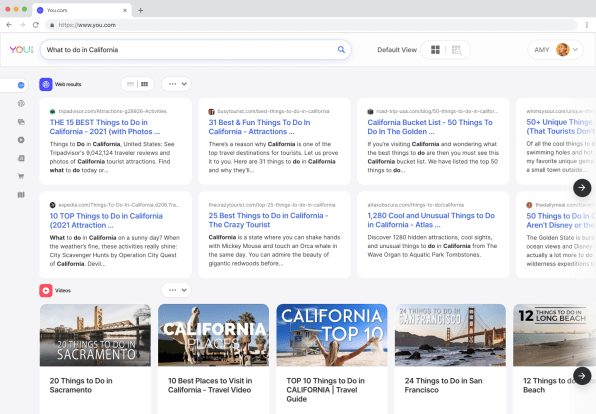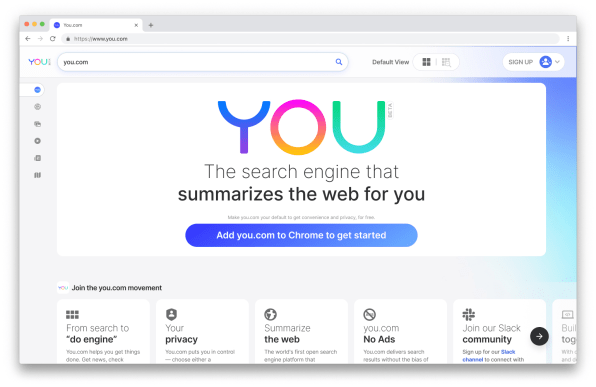For better or worse, You.com is unlike any other search engine you’ve used before.
Instead of organizing the results in a vertical list, you.com presents users with rows of horizontal panels – the company calls them “apps†– grouped by source. There is an app for Yelp, an app for Reddit, an app for Twitter, and an app for standard Bing results, among others. Users can then promote or demote these panels as they browse the results, creating a personalized search engine around their favorite sources.
“This is something that no one else has done yet,†says Richard Socher, founder and CEO of You.com, who was previously the chief scientist of Salesforce. “It’s sort of a new way of thinking about research. “
But while You.com is both new and ambitious, it’s also hard to get used to, and having to sift through a dozen or more content silos can feel counterproductive when not all of them meet your needs. . To really shake up search engine activity, You.com will need to do a better job of cataloging the brand new system it has created.
Disturbance with a side of privacy
You.com is part of a larger boom for privacy-focused Google search alternatives, including DuckDuckGo, Startpage, and Brave Search, and it’s equally keen to showcase its good faith when it comes to privacy. It does not mine users’ search histories for targeted advertising and does not attempt to track users after they have left the site. Users can also switch to an “Incognito†mode, which turns off personalized results but prevents You.com from storing search histories or IP addresses.

Right now, that leaves You.com with no way to make any money. Socher says the company is currently focused on growth (fueled by a $ 20 million funding led by Marc Benioff with participation from Breyer Capital, Sound Ventures, Day One Ventures and others). But he believes You.com will have plenty of business models to explore without turning personal data into targeted ads.
Most of You.com’s competitors are trying to get closer to the Google experience. Their differentiation is not so much in the basic search product as in the broader suite of tools they offer, such as Brave’s web browser or DuckDuckGo’s email privacy options.
On the other hand, You.com wants to rethink search results on a more fundamental level. Socher says the company has realized that the way people use the web is increasingly focused around a smaller number of larger sites, and users might want to dig deeper into these individual sources as they go. of their research. You.com’s horizontal panels are meant to make your job easier.
“Sometimes you can have a ton of useful content from one type of source, but in a vertical list it’s really hard for you to be able to zoom in more on that source without sacrificing everything else,†Socher says.
At launch, You.com offers around 100 of these sources, or “apps” – some it builds by crawling the Web, others by leveraging enterprise APIs – and plans to add more to the feed. time. It then uses an algorithm to decide which sources to display and how to organize them for a given query.
This is where the other major difference from other search engines is: from the results page, users can move individual panels up or down, which affects how they look. classified in similar searches. A settings menu also allows users to give each source a thumbs up or thumbs down, affecting their importance in all searches.
“It’s the AI ​​that people control, rather than the AI ​​that makes all the final decisions,†says Socher.

In the long term, he envisions a system where developers create their own You.com apps and submit them for approval, allowing a city bus service to post its schedules, or a blog to feature its stories, for example.
“The future, in my opinion, is that businesses will want to have a web app, an iPhone app, an Android app, and a You.com app,†Socher says.
Even so, the concept of building search-specific apps is entirely new, and You.com is not yet asking companies to participate. For important publications such as the New York Times and NPR, You.com has created its own apps on their behalf. Asked about creating a larger app store, Socher said it’s too early to discuss in depth.
Sorting sources
The You.com system has its moments. If you’re trying to troubleshoot a technical issue, it can be really helpful to be able to browse a dozen or more Reddit threads. If you’re looking for a place to eat, it’s good to get results from Yelp and TripAdvisor instead of just Google Maps. Searching for “Richard Socher” also yielded useful details Google missed, such as TechCrunch stories about his time at Salesforce and Hacker News discussions about his past work.

But there are just as many scenarios in which the siled approach struggles. As part of a search for unrelated stories, for example, I tried to look for examples of telecom executives saying they didn’t want to become “stupid guardians†for internet traffic. It’s a weirdly specific query, but one that’s best served by a long list of results from a wide variety of sources. On the other hand, having to scroll through the horizontal You.com web results panel was tedious, especially since You.com does not display article dates. on home plumbing problems.
You.com panels have also sometimes led to disconcerting results. When I searched for “iPhone 13 Pro deals,†for example, one of the results panels was from StackOverflow, with information about PHP tables. And while trying to resolve an issue with my newsletter, I was introduced to a scientific research panel from arXiv.org.
Even when everything works as expected, the panel-based approach can seem limited. Pianist Keith Jarrett’s search, for example, returned 20 results across the web, followed by Reddit gossip, quick facts, a few videos, a handful of outdated news reports, an odd detour by ESPN (for the rugby player of the same name), and a list of songs that only relate to Spotify. This broad overview of the different sources is somewhat useful, but it lacks the depth you get from digging into a traditional search engine, such as Google.

Socher claims that You.com’s depth will improve as it adds more apps, and that its horizontal panels can do a better job of highlighting new sources without forcing users to dig deep. -beyond the first page of search results in the first place.
“Anyone can participate on this page,†he says. “You don’t have to buy your way with ads or do all the SEO work. “
But as You.com is adding more sources, it will also have to figure out how to balance them all. The act of promoting and demoting different sources already seems somewhat tedious in the first iteration of You.com; an influx of sources could become downright exhausting.
That doesn’t make the attempt any less admirable. For decades now, Google has single-handedly set all of our expectations of how web search should work, and even its greener and privacy-conscious competitors are widely opposed to changing the formula. Whether You.com is successful or not, his perspective is welcome in a space where new ideas are long overdue.
“You look at the online space, and there have been a lot of types of innovation in different areas, with the exception of research,†says Socher. “To have such a long and unchallenged domination as a monopoly is a bit crazy. “

